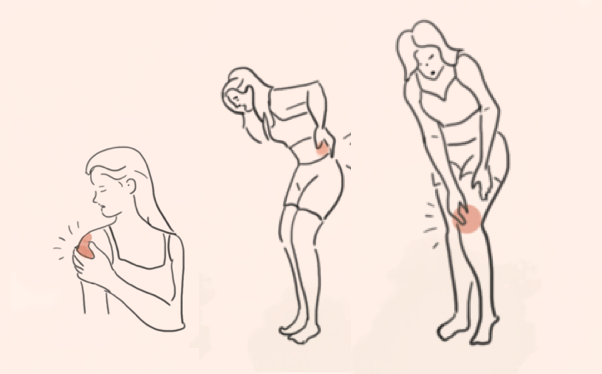
Science has proven that chronic, low-grade inflammation can turn into a silent killer that contributes to cardiovascular disease, cancer, type 2 diabetes and many other conditions. A sudden rise in auto-immune conditions and pain of idiopathic origin also raises serious red flags.
What exactly is Inflammation?
Heart disease, arthritis (and any -itis), Colitis, Sinusitis, dermatitis, autoimmune diseases, insulin resistance –all linked to inflammation, so inflammation must be terrible, right?
The fact that inflammation is a common, natural, innate response to injury/accident/infections is a hint that there’s probably something necessary about it. It’s not some accident, nor is it our body’s way of making life miserable. Your body can actually heal itself. And the first step towards the healing process is the inflammatory process. That’s right. Pain, swelling, redness, and that radiating sense of warmth that we feel at the site of an injury or illness don’t manifest by accident. That’s inflammation, and it’s essential!
The main goal of inflammation is to protect you from harmful invaders and promote fast healing and recovery. Inflammation itself is not bad. Without inflammation, wounds would become septic and even minor infections could result in tissue damage and become deadly.
However, not all inflammation is good. There are two types of inflammation: acute and chronic. Acute inflammation can enhance recovery from an injury or short illness, however, when inflammation becomes chronic, it can lead to further health problems, including chronic pain and disease.
Things happen pretty fast in an acute inflammatory response. When you are injured, receptors located at the injury site initiate the release of various inflammatory mediators, which in turn lead to four things: –
- They initiate vasodilation (or widening of the blood vessels). This allows increased blood flow to the injury site, which warms the site, give it that redness, and carries plasma and leukocytes to the site of injury to take care of any foreign matter that must have entered our body through that site of injury.
- The blood vessels become more permeable, thus allowing the plasma and leukocytes to flow through the blood vessel walls and into the injured tissue to do their work.
- Emigration of plasma into tissue also means fluid buildup, which means swelling.
- At the same time, the body releases an inflammatory mediator called bradykinin, which increases pain sensitivity at the site and discourages usage of the injured area.
These sensations – heat, redness, swelling, pain, and a loss of function – are annoying, but they are absolutely necessary for proper healing.
Then why do we say that inflammation is a silent killer and why is it being linked with all those chronic illnesses – like heart disease, diabetes, cancer and many more? How does something normal and helpful go haywire and become implicated in some of the most life-threatening diseases of our time?
The inflammatory response is supposed to be short and to the point. It isn’t meant to be on all the time. When inflammation becomes chronic and systemic, this is when it becomes a problem.
A big part of inflammation is targeting damaged tissue and invading pathogens, before building it back up, the inflammatory response has the potential to damage the body. That’s why it’s normally a tightly regulated system, because we don’t want it getting out of hand and targeting healthy tissue. But if it’s on all the time, regulation becomes a lot harder.
To learn how to prevent acute inflammation from turning into chronic inflammation we first need to find out What leads to chronic inflammation in our body?
The first and the most important is – Your diet! You are what you eat!
An Inflammatory diet: rich in sugar, processed refined carb products, trans fat, gluten, conventionally raised meat and dairy is usually low in nutrients. And this is one of the top causes of modern-day chronic inflammation. Certain foods are known to trigger your immune system and result in the over-production of pro-inflammatory cytokines and the under-production of anti-inflammatory cytokines.
The Standard American Diet (SAD): relies heavily on processed food, refined sugars, starches, and unhealthy fats. It lacks vegetables and fruits and hence is incredibly low on vitamins, minerals, and antioxidants. It’s also very low in fiber which is essential for healthy digestion and detoxification. No wonder that The SAD diet has been linked to increased risk of health conditions, such as diabetes, cardiovascular disease, and cancer, all of which are linked to chronic inflammation.
You can learn more about how an anti-inflammatory, healing diet can keep inflammation in check in our self-paced online course on Managing Pain with Diet and lifestyle.
Excessive omega-6 intake: Omega-6 fats form the precursors for inflammatory eicosanoids, which are an integral part of the inflammatory response. High omega-6 status means excessive production of inflammatory mediators leading to chronic inflammation if not counterbalanced with enough omega-3 fats.
Insufficient omega-3 intake: Omega-3 fats form the precursors for anti-inflammatory eicosanoids, which are an integral part of the inflammatory response. Poor omega-3 status means insufficient production of anti-inflammatory mediators.
Environmental Toxins: can be found in the air you breathe, the food you eat, the water your drink, and the products you use on your body. Air pollution, smoke, heavy metals, and mold exposure are all examples of environmental toxins you may be subjected to. Conventional cleaning and body care products, medications, and even processed foods are filled with ingredients that are unnatural and toxic to your body.
Long-term exposure to environmental toxins can become overwhelming to your immune system and result in increased chronic inflammation which may increase your risk of disease.
Lack of sleep: Sleep is the time when our body is repairing and building itself! Poor sleep is a chronic problem in developed nations. Either we go to bed too late, wake up too early, or we use too many electronics late at night and disrupt the quality of what little sleep we get. Also, when we don’t sleep well we wake up tired and fatigued and this becomes a vicious cycle which puts us in a state of stress that results in the release of inflammatory markers!
Sedentary lifestyle: Lack of activity is strongly linked to systemic, low-grade inflammation.
Over exercise: When we think that exercise is beneficial for us we tend to over-exercise at times, with too little rest and recovery. These people are certainly not sedentary, but I am sure they will be chronically inflamed.
Chronic stress: Modern life is stressful. And stress leads to chronic inflammation in the body! Stress activates your HPA axis. And if you are stressed all the time, it may lead to HPA axis dysregulation. This is a major cause of chronic inflammation in the body!
Leaky gut: Our gut is the home of our immune system. When it’s unhealthy, so is your inflammatory response! When your gut is inflamed it becomes leaky and loses its selectively permeable quality. This overwhelms your immune system as it now has to deal with anything and everything that enters your blood stream!
Unlike acute inflammation, chronic inflammation can last for several months or years. It continues until the cause of the inflammation is addressed. You must address the underlying causes of your inflammation in order to stop it and prevent further damage in your body.
Want to learn more on inflammation, what’s the difference between acute and chronic inflammation and what are its risk factors, causes and consequences. Powerful strategies on how to lower inflammation and reduce the risk of disease with diet and lifestyle instead of non-steroidal anti-inflammatory drugs (NSAIDs), do check out our self-paced online course on managing pain with diet and lifestyle backed with the wisdom of Ayurveda!
Check out all of OUR SELF-PACED ONLINE COURSES that include a perfect blend of Holistic Nutrition and ancient Ayurvedic wisdom!
- THE COMPLETE GUIDE TO STRESS MANAGEMENT
- TAKE CONTROL OF YOUR BLOOD SUGAR NATURALLY!
- BASICS OF HEALTHY EATING
- THE DIGESTION- IMMUNITY CONNECTION
- MANAGE BACK PAIN USING DIET & LIFESTYLE
- WHAT’S YOUR DOSHA?
- BASICS OF AYURVEDA
CONNECT WITH US & BE THE FIRST ONE TO RECEIVE DISCOUNT COUPONS FOR ANY OF OUR SERVICES!
NAMASTE,

Preeti Syal
M.Sc., R.H.N., Certified Ayurvedic Lifestyle Consultant
The content provided in my blogs are for knowledge sharing purposes only and is not intended to be a substitute for professional medical advice, diagnosis or treatment.


